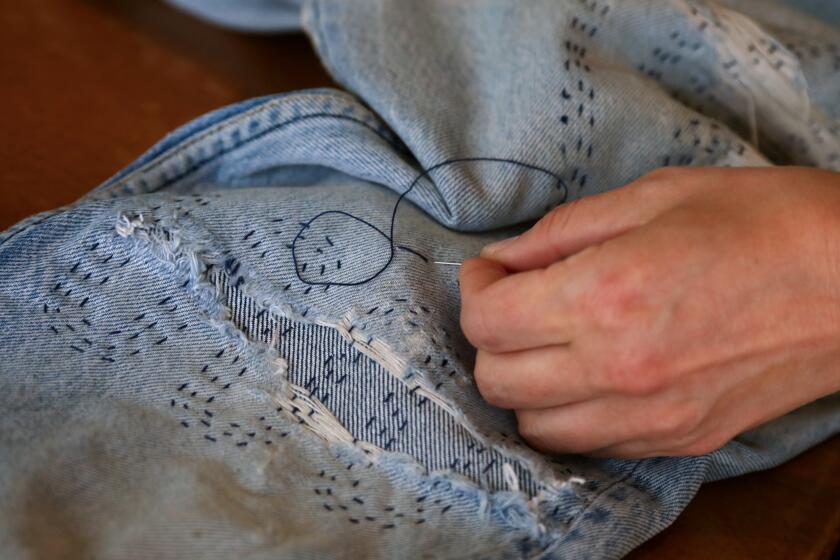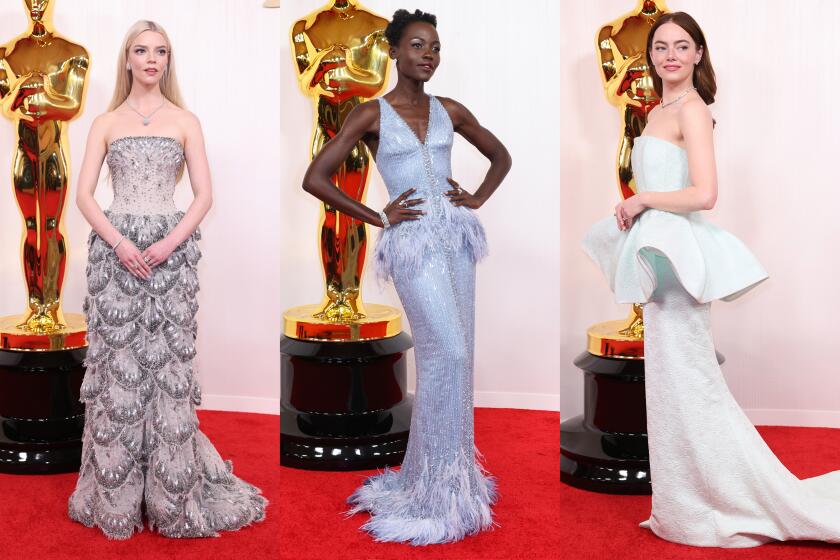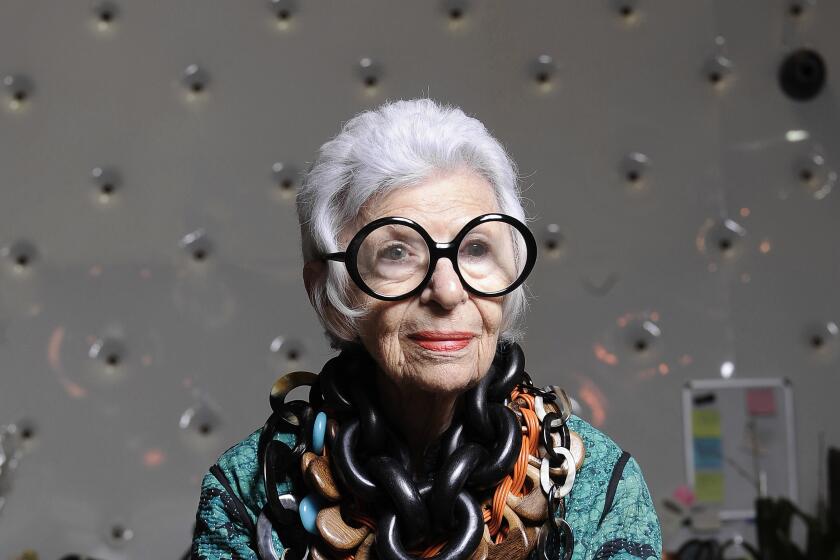You’ve heard of food trucks? Here comes the fashion truck
Fast fashion has taken on a whole new meaning lately, with designer racks rolling into driveways; truckloads of athletic shoes, fitness experts and treadmills, touching down at food festivals; and full-fledged runway shows staged on the backs of flatbed trucks.
Taking a page from the gourmet food truck playbook, apparel and accessories brands are increasingly opting to barnstorm the highways and byways 21st century style, putting their products in front of people nationwide, supported by social networking tools that help get the word out and hoping to reconnect with customers where it counts — in their own backyards.
“On many levels it’s the ultimate in customer service,” says fashion designer Cynthia Rowley, whose “mobile style unit” — a converted courier truck that serves as a boutique on wheels — has been on the road for the last year. “It’s more convenient, more immediate, and more of an experience than buying online to actually bring the store to our customers.”
The concept is hardly novel — mobile shops of one kind or another have been around for years (think of the old milk trucks and dry-cleaner delivery services of the last century) — but so many clothing brands climbed behind the wheel this summer that a sartorial SigAlert seemed imminent.
In addition to Rowley’s rolling storefront, Skechers recently wrapped a 20-city, three-month, coast-to-coast “Shape-Up America Tour” in New York City’s Times Square. Fashion designers Sam Shipley and Jeff Halmos spent August promoting their Shipley & Halmos label (and compiling a limited-edition photo book) by meeting up with customers at Barneys Co-op locations across the country. And women’s contemporary label Alice + Olivia spent the summer touring the Southern United States in a revamped Airstream mobile home that served as a combination pop-up shop and makeover wagon.
Fashion Los Angeles, a group that hopes to stage its first fashion week events in Los Angeles in February 2011, plans to use the back of a flatbed semi as a catwalk to take fashion shows to high-traffic areas such as malls and college campuses around the city.
“It’s an idea that’s absolutely ripe for exploitation at the moment,” says David Wolfe, creative director of the New York trend forecasting firm the Doneger Group. “Shoppers are exhausted by the traditional venues, the whole world is ‘over-retailed’ to beat the band. It’s not like the merchandise is any different, but the setting is unexpected, funky, weird and young. And definitely not serious.”
Rowley sees it as part performance art. “It’s an experience,” she says. “I’ve had people tell me they thought it was just cool to be able to buy a fashion piece from a truck.”
But to hear Rowley tell it, her inspiration was as much serendipity as strategy, motivated by the announcement that DHL was planning to end its express domestic shipping service.
“I had one of those smack-on-the- forehead moments,” Rowley said. “I’d seen the taco trucks around and thought there would be this plethora of leftover DHL trucks — so why not try to put one to good use?”
The New York City-based designer quickly scored one (via eBay) and spent a couple of months tricking it out with boutique touches: cutting a storefront window in one side, laying down a dark hardwood floor, sectioning off a fitting room and adding a sound system, Lucite fixtures and a striped awning.
At first, the truck was used for private parties and events. Then in October 2009, loaded with just about one of everything from the Cynthia Rowley collection (clothes, shoes, bags and accessories as well as pieces from Rowley’s Roxy collaboration) it left New York City and has been on the road ever since.
In early August, the truck rolled in to Fashion Island in Newport Beach and set up shop — meaning that for the first time, going to the closest Cynthia Rowley boutique didn’t require Southern Californians to fly to Chicago. The blue floral-patterned truck has been popping up in So Cal locations ever since, most recently with appearances in Los Angeles last week. Eventually, the truck will work its way up the California coast.
Somewhere along the way, it could very well pass another merchandise-laden motor home — this one headed from San Francisco to Miami — loaded with limited-edition products from Hello Kitty and friends to celebrate the 50th anniversary of parent company Sanrio.
“It’s going to be stocked with 50 special items to signify the 50th anniversary,” explained Janet Hsu, president of Sanrio Inc. “And being mobile will allow us to be flexible about how we interact with fans. For example, if we hear of a music festival along the way, we can add a stop.”
Hsu, who is based out of Sanrio’s Los Angeles offices, said she and her team came up with the idea based on an increasingly familiar sight in the city. “We were definitely inspired by the food truck,” Hsu said. “We saw how they end up bringing together people with shared interests — like a specific kind of food — in a way that is a shared experience. And we thought this would give us a way to really connect with our fans in a way that’s meaningful.”
Connecting with the consumer was the big draw for others as well. “It allows for a more personal, in-depth, one-on-one experience,” said Jennifer Weiderman, vice president and general manager of Skechers Fitness Group. “It lets them see and touch, to try on the product, talk to fitness experts. We have treadmills and even a little mock track that we set up. It’s the kind of whole experience you can’t really have if you’re doing [an event] at a store.”
Wolfe thinks that’s an antidote to the malaise of the current retail landscape. “In a funny way it’s like the old Tupperware parties or the Avon Lady approach. You’re communicating in a very intimate way with customers in a time when shopping has become so impersonal in most places.”
Could the mobile format be the next evolution of the popular pop-up boutique — those temporary bricks-and-mortar storefronts that sprout up unexpectedly — and have a lifespan measured in weeks or months? “Absolutely,” says Wolfe. “For one thing, it’s fun. The recession has made shopping into a very serious pursuit — even for the people who have plenty of money to do it. The joy and thrill of the hunt is no longer appealing, so I think this strikes a whole different chord, and elicits a whole different response from the consumer. Who could resist it?”
Wolfe’s theory seemed to bear out on a recent Thursday afternoon in Silver Lake. Rowley’s truck, open for business in the parking lot of Dangerbird Records on Sunset Boulevard, had sold $1,000 worth of Cynthia Rowley goods in the first 21/2 hours according to truck manager Paige Segal (with 20% of that — as with all sales from that day — earmarked for the Pablove Foundation, a charity that funds pediatric cancer research).
Among those who clambered into the back of the truck to search the racks was Brie Grousbeck, 34, of Los Feliz, who said she’d found out about the event through the charity it was supporting that day. “I found out about it through Pablove, and that’s my main motivation,” she said. “But this is a brilliant idea — going to people’s neighborhoods like this makes them want to shop.”
To prove her point, Grousbeck pointed to a $330 nude silk sheath dress studded with nailhead embellishments that was selling for $150. “I am leaving with that,” she said. When she eventually did leave an hour and a half later, Grousbeck had the dress in hand, along with a pair of gray, paillette-covered silk shorts and a pair of sandals from the Cynthia Rowley X Roxy collection. “The sandals are for a friend of mine,” she said with a sheepish grin. “I was in [the truck] snapping away with my cellphone camera and sending them to her.”
Silver Lake resident Jessica Gershen, 32, was walking down Sunset Boulevard with her daughter on one arm and an Apple laptop in the other, fresh from her bookkeeping job at a local yoga studio, when the fashion truck caught her attention. Moments later, they were up the makeshift stair steps and riffling through the rack. Even though they left empty-handed a few minutes later, Gershen said she liked the idea of rolling retail. “It’s exciting — especially since you can’t find Cynthia Rowely around here. You usually need to go to someplace like West Hollywood.”
Rowley isn’t sure how popular the fashion truck will end up being. “It has to be a good fit for your brand,” she said. “It has a little bit of that band-on-the-run spirit that fits in with my personality more than a pop-up shop.” Doneger’s Wolfe concurs. “It’s not for everybody — I can’t see [fashion designer] Carolina Herrera driving a truck around, for example.”
But Rowley, who also uses her mobile boutique as a way to test potential future retail market sites, says her experience has been so positive, she’s contemplating expanding into a full-fledged fashion fleet.
“I can see doing a truck for every part of our business — there could be one geared toward moms and kids filled with kids’ clothes and maybe our Pampers [yes, she is designing diapers in a collaboration] that would be able to go somewhere convenient for moms and dads with kids — like near playgrounds — and another one geared more toward beauty and grooming products.”
After a moment’s pause, she adds: “I always have to tell the girls driving the truck to make sure no one’s in the fitting room when they drive off.
“So maybe we should offer some sort of transportation service.”




